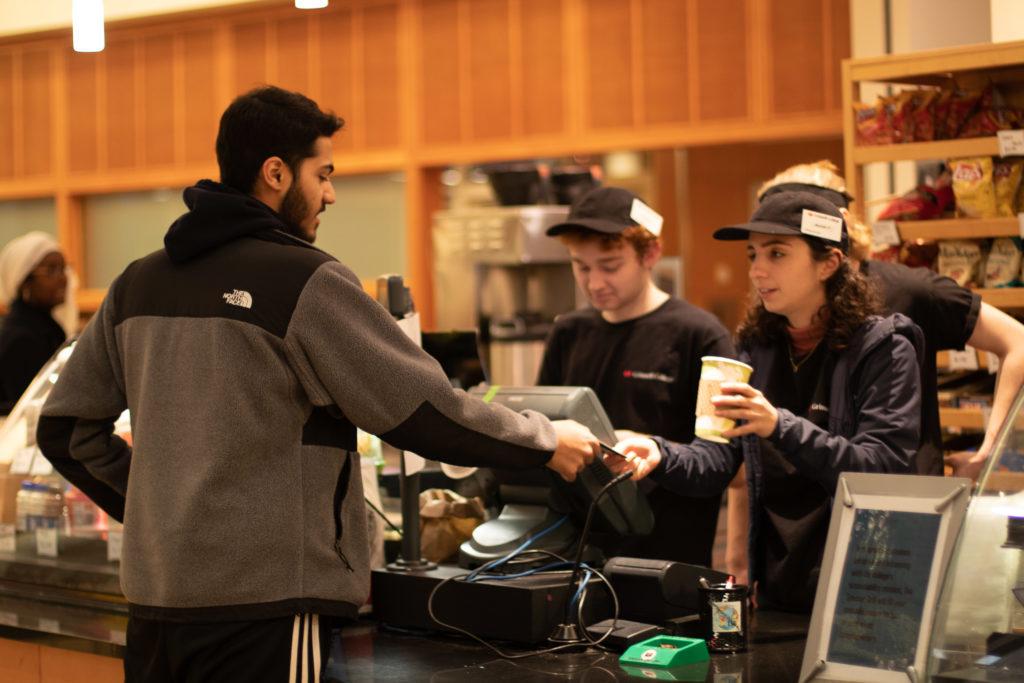The Union of Grinnell Student Dining Workers (UGSDW) published a report on Jan. 21 alleging a possible pattern of racial discrimination directed towards student employees at the Spencer Grill. The report shows that, since 2017, more international students and students of color have faced disciplinary actions and been fired from the Grill than their white coworkers.
Grill employees operate under a system of “cuts” similar to a “three strikes” system. Every time employees break a rule, they receive a cut from Grill supervisors. After three cuts, they are fired.
According to the UGSDW’s report, “the median domestic white student worker receives 0.6 cuts a semester, while the median student worker of color/international student worker receives 0.9 cuts a semester.”
Once a student gets three cuts, the Assistant Director who oversees the Spencer Grill, Lisa Thornton, contacts them to tell them that they have been fired from the Grill. However, the UGSDW website describes a racial disparity in this procedure.
Their report states “For student workers who do receive a third cut, student workers of color/international student workers are more likely to be fired than their domestic white peers by 24 percentage points. Since January 2017, over 25 [percent] of African American student workers and nearly 20 [percent] of international student employees lost their jobs, compared with just 5 [percent] of domestic white employees.” This means that white students who receive three cuts are more likely to keep their job than their international or domestic student of color coworkers.
“What it comes down to is extra leniency given to white students,” said Cory McCartan ’19, union advisor and the author of the report.
In November 2018, McCartan decided to investigate the data collected by Dining Services about cuts and firing from the Grill. The union asked for this data after hearing from many Grill employees that they were concerned about discrimination. Since Dining Services does not hold on to records of cuts and terminations indefinitely, data from before 2017 is not available.
The College issued a Special Campus Memo contesting the results of the data, arguing “The College has already undertaken its own analysis of the data relied on in the report and has found the limited data insufficient to draw meaningful conclusions.” The College has not made their own analysis public, but plans to hire a third-party investigator to look more closely at the possibility of discrimination.
Leslie Gregg-Jolly, interim chief diversity officer of the College, said “I think it’s a really serious allegation and we need to treat it with utmost attention and that’s why I think it’s critical that we get this external evaluator. We cannot make any conclusions or decide what we want to do until we have an independent investigation.”
Although the College is sponsoring this investigation, McCartan was left with the impression that “[The College is] really trying to do the minimum necessary to sort of patch this up and move on,” after he and Sam Xu ’20 met with Mary Greiner, assistant vice president of human resources at the College, and the College’s lawyer, Frank Harty.
When McCartan requested a meeting with College administrators, he said he expected Greiner to include more people in the meeting. He reports having carbon copied Gregg-Jolly on preliminary emails about the meeting.
McCartan said, “it was sort of notable who wasn’t in the room, such as the chief diversity officer, anyone from Dining Services or anything, so schedules are hard to coordinate, but if they say they take this seriously they should really have more room to talk about it.”
Since the UGSDW report came out, McCartan says a handful of students have decided to initiate grievance processes which could help them get their jobs at the Grill back on the grounds that they were discriminated against.
McCartan said that he was told at the meeting that “[The College was] going to try to get those grievances thrown out on technical grounds,” those being that too much time has passed since the students were fired.
However, in an interview with The S&B, Gregg-Jolly said, “I have no knowledge about what you just described [about throwing out the grievances] … The statement that you made does not resonate with the practices in my office” and said that she was not aware of the meeting.
While the investigation is ongoing, McCartan wants the College to make sure that no discrimination happens in the meantime.
Gregg-Jolly said out that students could come to her to start a grievance process or seek resources while waiting for results from the investigation.
“I’m happy to meet with anyone about what that means, how they might go about the process,” she said. “We also have an ombudsperson who is a confidential resource, so anyone can go to the ombudsperson. We do have a non-retaliation policy at the College as well, even with that some people don’t feel comfortable coming forward necessarily, so we have an intercultural affairs department where people can talk to people like [Associate Dean of Students & Director of Intercultural Affairs]Maure Smith-Benanti also. And part of the grievance process is that people can just come talk to me or Maure, someone they feel comfortable with, and learn about the possibilities.”
McCartan also wants the Grill to start keeping more-detailed records of cuts and firings, but the lawyers allegedly told him that the College did not have to, and therefore would not keep better records. But Gregg-Jolly said, “I don’t know anything about that.”
Despite a lack of coordinated responses to the allegations from the administration, the results of the third-party analysis will be made public sometime in the future.

Photo by Sofia Mendez

























































